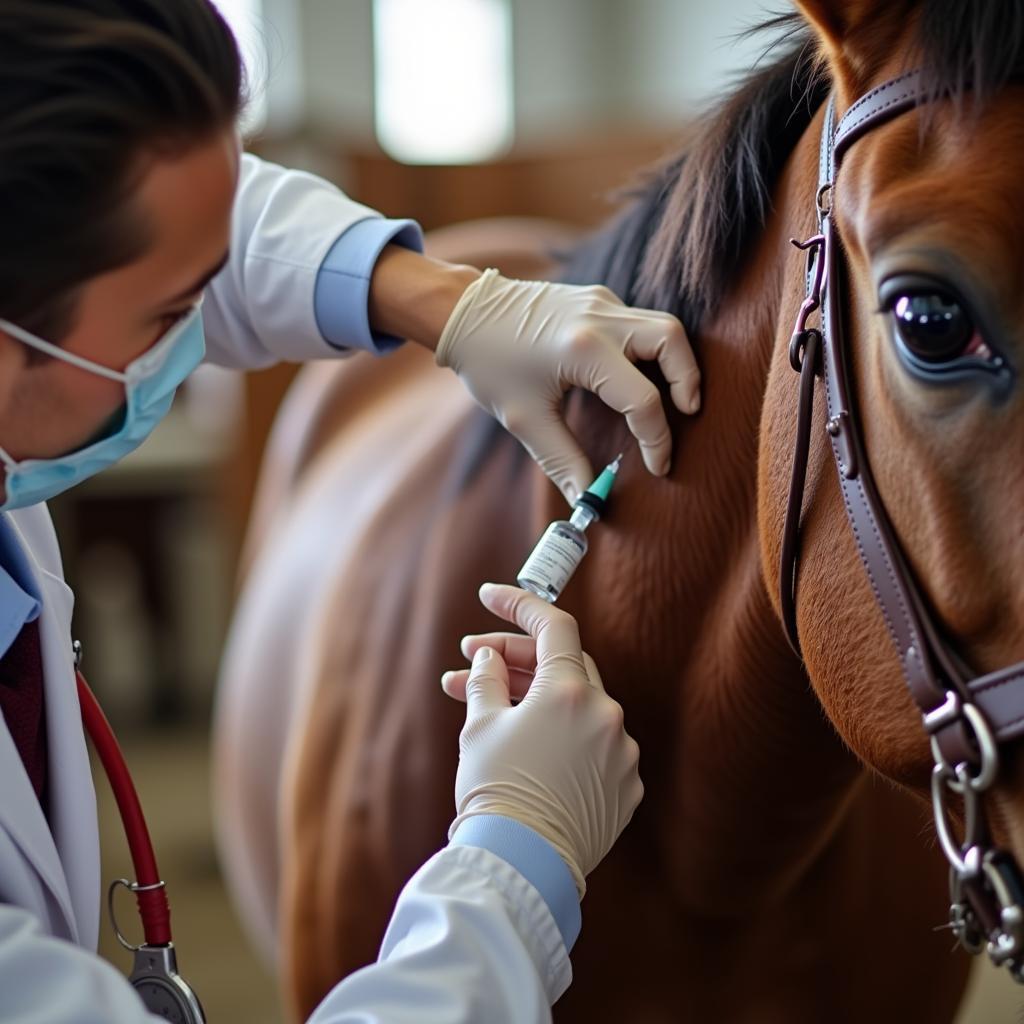Tetanus in horses, also known as lockjaw, is a serious bacterial infection that affects the nervous system, causing muscle stiffness, spasms, and potentially fatal complications. Recognizing the signs of tetanus in horses is crucial for prompt veterinary intervention and better chances of recovery.
Understanding Tetanus in Horses
The bacterium Clostridium tetani, commonly found in soil, manure, and the digestive tracts of animals, is responsible for tetanus. It enters the horse’s body through wounds, even seemingly minor cuts, punctures, or surgical incisions. Once inside the body, the bacteria release toxins that disrupt nerve signals, leading to the characteristic muscle stiffness and spasms associated with tetanus.
Recognizing the Signs: Is Your Horse Exhibiting Tetanus Symptoms?
Early detection of tetanus in horses is vital. Here are some common signs to watch out for:
- Muscle Stiffness: One of the earliest signs is often stiffness, especially in the legs, jaw, neck, and facial muscles.
- Sawhorse Stance: As the disease progresses, horses may develop a characteristic “sawhorse stance” with their legs stiffly extended and their tail held out straight.
- Third Eyelid Protrusion: The third eyelid, located in the inner corner of the eye, may protrude across the eye.
- Facial Twitches: Noticeable twitches or spasms in the facial muscles, particularly around the nostrils and lips, are common.
- Difficulty Eating and Drinking: Muscle spasms in the jaw and neck can make it challenging for horses to chew and swallow, leading to drooling and weight loss.
- Sensitivity to Stimuli: Horses with tetanus often become highly sensitive to light, sound, and touch, leading to exaggerated startle responses.
What Causes Tetanus in Horses?
Tetanus is not contagious from horse to horse. It’s caused by the Clostridium tetani bacteria entering the body through:
- Puncture Wounds: Nails, splinters, or sharp objects penetrating the hoof or skin are common culprits.
- Lacerations: Cuts or tears in the skin, even if they seem minor, can provide an entry point for the bacteria.
- Surgical Sites: While rare, tetanus can develop if surgical incisions are not properly cleaned and cared for.
- Umbilical Cord Infections: Newborn foals are particularly susceptible to tetanus if their umbilical cords become infected.
Prevention Strategies: Safeguarding Your Equine Companion
Vaccination is the cornerstone of tetanus prevention in horses.
- Initial Vaccination: Foals should receive their first tetanus vaccine between 4 to 6 months of age.
- Booster Shots: Annual boosters are essential for maintaining immunity throughout the horse’s life.
- Wounds: Promptly clean and disinfect any wounds, no matter how small, with an antiseptic solution. Consult your veterinarian for appropriate wound management and the potential need for a tetanus booster.
 Veterinarian Administering Tetanus Vaccine to Horse
Veterinarian Administering Tetanus Vaccine to Horse
The Importance of a Horse First Aid Kit
Having a well-stocked horse first aid kit list is crucial for dealing with wounds promptly. Essential items include antiseptic solutions, sterile gauze pads, bandages, and a thermometer. Familiarize yourself with basic equine first aid so you can provide immediate care while waiting for the veterinarian.
When to Call the Veterinarian: Don’t Delay!
If you suspect your horse is showing signs of tetanus, contact your veterinarian immediately. Tetanus is a serious condition that requires prompt and aggressive treatment.
“Early intervention is key in cases of tetanus,” says Dr. Emily Carter, an equine veterinarian with over 20 years of experience. “Horses that receive treatment in the early stages of the disease have a significantly higher chance of recovery.”
Treatment Options: A Veterinarian’s Approach
Treatment for tetanus typically involves:
- Antibiotics: To combat the bacterial infection.
- Tetanus Antitoxin: To neutralize the toxins produced by the bacteria.
- Wound Care: Thorough cleaning and debridement of the wound to remove any remaining bacteria.
- Supportive Care: Providing a clean, quiet, and dark environment to minimize stimulation. Fluid therapy and nutritional support may also be necessary.
 Horse Recovering from Tetanus in Stable
Horse Recovering from Tetanus in Stable
Conclusion: Protecting Your Horse from Tetanus
Tetanus is a preventable disease, and vaccination remains the most effective way to protect your equine companion. Understanding the signs of tetanus, providing immediate wound care, and maintaining a regular vaccination schedule are essential steps in safeguarding your horse’s health and well-being.
Remember, if you observe any signs of tetanus in your horse, don’t hesitate to contact your veterinarian immediately. Early intervention can make a significant difference in the outcome and increase the chances of a full recovery.
FAQs: Common Questions about Tetanus in Horses
Can humans get tetanus from horses?
No, tetanus is not contagious from horses to humans. However, humans can contract tetanus through contact with contaminated soil or objects.
How long does it take for tetanus to show up in horses?
The incubation period for tetanus in horses can vary from a few days to several weeks, but most cases develop within 14 days of infection.
Can a horse survive tetanus?
The survival rate for horses with tetanus depends on various factors, including the severity of the infection, the horse’s overall health, and how quickly treatment is initiated. Early and aggressive treatment significantly improves the chances of survival.
What does the tetanus vaccine for horses cover?
The tetanus vaccine for horses specifically targets the toxins produced by the Clostridium tetani bacteria, effectively neutralizing their harmful effects.
How effective is the tetanus vaccine in horses?
The tetanus vaccine is highly effective in preventing tetanus in horses. When horses are appropriately vaccinated and receive regular boosters, their risk of developing tetanus is significantly reduced.
Can a horse get tetanus twice?
Unlike some diseases, recovering from tetanus does not provide horses with lasting immunity. Therefore, continued vaccination is crucial for ongoing protection.
What should I do if my horse steps on a nail?
If your horse steps on a nail or sustains any puncture wound, clean the wound thoroughly with an antiseptic solution and contact your veterinarian immediately. Your vet can assess the wound and determine if a tetanus booster is necessary.
Need More Information on Equine Health?
- Learn more about the five-way horse vaccine.
- Explore essential information about CEP for horses.
- Access a comprehensive horse vaccination chart for guidance on vaccination schedules.
For any concerns or inquiries regarding your horse’s health, please don’t hesitate to contact us. At Justus Horses USA, we’re committed to providing you with reliable information and resources to help you provide the best possible care for your equine companion.
Contact us:
Phone: 0772127271
Email: [email protected]
Address: QGM2+WX2, Vị Trung, Vị Thuỷ, Hậu Giang, Việt Nam
Our dedicated customer support team is available 24/7 to assist you.